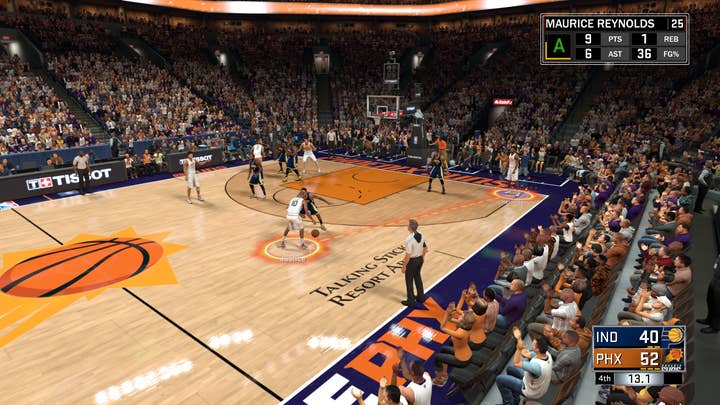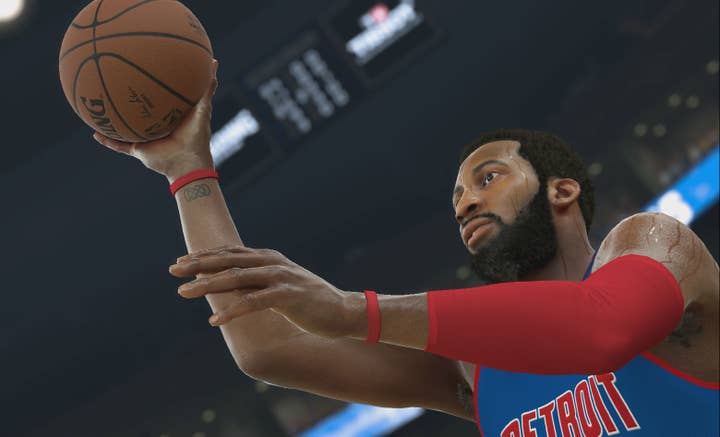NBA: “Esports is a massive industry, and we think we have a place in it”
The basketball league's esports boss discusses decades-long plans for professional competitions with 2K Games
A 71-year-old traditional sports organisation investing in esports might seem a little backwards. Why, after all, would people tune in to watch a video game version of basketball when they can watch the real thing?
To Brendan Donohue, managing director for the upcoming NBA 2K League, the appeal of esports basketball is "a totally different experience", pointing to the colossal audiences seen by other esports competitions as proof.
"This is a massive industry and we think we have a place in it," he tells GamesIndustry.biz. "The success of the 2K game and the popularity of the league makes this a logical step for us to take."

He continues: "We have great data on NBA fans, and that's a massive audience. We see that NBA fans are more likely to play video games, and actually more likely to engage in esports than fans of other sports. We think there's a pretty nice marriage here.
"I don't think you have to be a fan of 2K to enjoy watching. That's one of our advantages: the NBA 2K game, and basketball more broadly, are globally recognisable. You can watch having never played the 2K game before and understand what's going on. That gives an advantage with that more casual audience.
"[Games like League of Legends] are awesome games, but they can be intimidating [to watch] of you've never played them."
Even so, esports still presents something of a risk, even for a long-running and hugely successful organisation like the NBA. A recent study by YouGov found that only 44% of US adults are aware of esports, and only 29% of those have watched competitions or coverage before.
Despite this, Donohue believes the notion that esports isn't being taken seriously by audiences today is a "misconception", adding: "If you look at last year's League of Legends final, and their audience was bigger than the Oscars. That suggests that it's arrived."
The NBA hasn't simply taken the plunge based on the buzz around the growth of esports. It has already hosted its own tournament as a test for the new league. Last year's Road To All-Star competition attracted 500,000 competitors on 100,000 teams, and the livestreamed finals pulled in an online audience of more than 2 million people.
"Last year's League of Legends final audience was bigger than the Oscars. That suggests esports has arrived."
"We know there's an audience for this, and quite honestly, putting our weight behind it, plus that of the 17 teams and 2K, I think we're going to get traction," says Donohue. "I don't think awareness will be our issue. People are close enough to the NBA and 2K brands that they'll be aware of us."
He also stressed that this is neither a moneymaking venture designed to capitalise on the popularity of esports, nor a sunk marketing cost to draw yet more attention to the NBA. Next year's NBA 2K League is instead the foundation for an esports venture that will grow for years - at least, that's the association's hope.
"We are focused on building an authentic community through the NBA 2K League," Donohue explains. "Revenues are a secondary goal right now. Our first goal is to scale this and make it a global entity - and we're pretty confident we can do so.
"There's a significant appetite for the game in the US, but more importantly globally. We have a free version of the game in China that has 34 million registered users. That suggests there's a global appetite for the game; in fact, I don't think people understand how big the 2K game is globally."
He continues: "This is a long-term play for us. We expect this to be around for decades, so the primary goal is building an audience, doing that in the right way, and creating an environment where our players can be successful. We're confident the revenues will follow if we do that right."

The NBA League will start modestly. A partnership between the association and Take-Two Interactive, it will host 17 teams of five players who will each create a newly-developed avatar rather than the recreated real-world superstars found in the 2K game. Ensuring esports teams have a full squad of five is crucial to making this an authentic competition.
"That's what esports is - there should be no artificial intelligence in the game, so it'll be five vs five with real people controlling it," says Donohue.
"If you just watch the engagement level of fans when they're watching a broadcast - it's unprecedented. There's a lot to be learned from how Twitch and others in the esports space do this"
"And the avatars means it's not LeBron versus Steph Curry. In order for us to create a level playing field, you have to have players on the same level in terms of the skill they're given. Then it's up to them, and their own personal skills, to differentiate themselves from other players."
Qualifiers will take place in February, with the 85 players selected in March. All games will be played in one or two central locations, and the NBA is currently in discussions to have matches televised or streamed.
It's notable that this is the first esports league to be arranged by a professional US sports league - although the NBA is certainly not the first traditional sports organisation to invest heavily in the world of competitive gaming.
Over the past few months alone, we've seen the NFL's Marshawn Lynch and Michael Strahan, former Yankee Alex Rodriguez, Tampa Bay Lightning owner Jeffrey Vinik and others invest in esports teams. Meanwhile the owners of the New England Patriots and New York Mets have set up Overwatch League teams, and even world-famous venue Madison Square Garden has bulked up its in-house esports resources as it prepares to accommodate more professional gaming competitions.
Interest in esports within the US sports industry is undeniably growing, but Donohue argues that, in some cases, esports is bleeding into the world of traditional sports and drawing these professionals in.
"Madison Square Garden wasn't necessarily investing in esports; esports started filling its buildings," he suggests. "All of a sudden there were esports events being held at Madison Square Garden, at the Staple Centre, at the Air Canada Centre in Toronto. They were filling their buildings and I think that was really opening to those folks.
"This league opens up the door to so many new audiences for us, whether it's 2K fans, esports fans - we think it presents a lot of interesting opportunities"
"We have a good number of [team] owners who are involved in esports more broadly. They're involved in other titles. So in some respects, they brought us into this."
As more sports venues serve the needs of the gaming community, it could establish the US as a market where esports are primarily hosted in the same buildings as traditional ones. Dedicated esports arenas are slowly emerging all over the world, although Donohue notes that they are often only able to seat a few thousand people, while the likes of Madison Square Garden can cater to much larger audiences.
"It depends on how modular arenas are in terms of being able to accommodate esports events,". If the event is big enough and a sports arena can make it work for an esports coordinator, I think it's logical you'll see more esports events in more traditional arenas."

The crossover between the two sporting worlds not only benefits the younger business of professional gaming but can also provide valuable learnings for the likes of basketball and baseball leagues. That, Donohue says, is one of the many reasons why the NBA is investing in esports.
"We expect this to be around for decades, so the primary goal is building an audience. The revenues will follow if we do that right"
"We are always open to learning from other sports, companies and businesses," he says. "When we look at the esports industry, there are some amazing things happening that we love. For example, the way in which the community is so engaged. Traditional sports can learn from the access fans and communities have to players. Imagine our top player in the league next year being able to do a behind-the-scenes access and showing players around the world how he does a pick and roll. That type of access is what we're looking at here. That's a game-changer for sports."
He also says there is plenty for the NBA and its fellows to draw from the way esports are broadcast and covered: "If you just watch the interactivity and engagement level of fans when they're watching a broadcast, it's unprecedented. It's pretty remarkable to see how they engage with the products. There's a lot to be learned from how Twitch and others in the esports space do this... Twitch has 10 million daily viewers, and that's going to continue to grow and grow. If the quality content and the audience is there, I think the [network] broadcasters will follow."
It's perhaps easy to forget the crucial element that enables the NBA 2K League to even take place: the video game itself. Take-Two's NBA 2K series is the most popular to be based on a US sports league, and sales of 9 million copies for last year's entry suggest this isn't about to change. Even today, the game enjoys 1.6 million daily users and 4 million monthly, and NBA 2K18 is already off to a good start ahead of next year's esports league.
Donohue concludes with a personal anecdote that highlights how titles like this not only provide the grassroots audience for any esports ventures the NBA might run, but also draw in new fans to the world of traditional basketball - which will ultimately remain the association's biggest earner.
"I play 2K with my 11-year-old son all the time," he says. "His knowledge of the NBA, of players, of stats, of player attributes comes from playing 2K. That's where his fandom of NBA comes from. That embodies why we're excited about this opportunity: this league opens up the door to so many new audiences for us, whether it's 2K fans, esports fans - we think it presents a lot of interesting opportunities."








